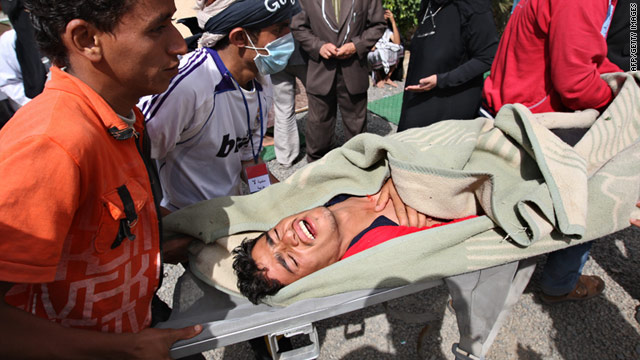
- Anti-government protesters wanted to enter Change Square
- Security forces set up a road block
- Protesters forced their way in
- Security forces responded by shooting and lobbing tear gas, witnesses say
(CNN) -- For the second time in two days, security forces fired live ammunition and lobbed tear gas during protests in Change Square outside Sanaa University on Sunday, Ala'a Al-Khowlani, a witness at the scene, said.
Other witnesses told CNN that at least 10 people were injured.
The clashes began after pro-government demonstrators and security forces set up a road block preventing anti-government protesters from entering Change Square, witnesses said. While protesters were allowed to leave, they were not allowed to re-enter.
Anti-government protesters demanded they be allowed in, and tensions heightened when they forced themselves through the road block, witnesses said. After the protesters made their way in, the shooting started and tear gas was used, they reported.
According to Al-Khowlani, some believe that security forces and police dressed as civilians were shooting into the crowd from nearby rooftops.
In Aden City on Sunday, four protesters were injured by security forces gunfire, witnesses there said.
One day earlier, three people in Aden City died from gunshot wounds when security forces tried to disperse an anti-government rally, a medical official with the group Youth for Change said. A fourth person was killed in Dar Saad, in Aden Province, when a group of anti-government protesters stormed a government complex and set a police station on fire, the medical official said.
A Yemeni Interior Ministry official acknowledged that one person was killed by security forces, but said those who raided the complex were gang members and not protesters.
Regarding the killings in Aden City, a security official called the demonstrators "separatists" rather than protesters, and would not comment on the alleged shootings by security forces.
"The government is trying to keep people as safe as possible," the official said.
Across Yemen, high unemployment fuels much of the anger among a growing young population steeped in poverty. The protesters also cite government corruption and a lack of political freedom.
On Thursday, President Ali Abdullah Saleh -- who has promised not to run for president in the next round of elections -- pledged to bring a new constitution to a vote by the end of the year and transfer government power to an elected parliamentary system.
Human Rights Watch released a statement Saturday, calling on countries that support Saleh to make aid contingent on the government stopping its attacks on demonstrators.
"President Saleh has once again broken his promise to end attacks on peaceful protesters, and those who supply his government with weapons risk complicity in this bloodshed," said Joe Stork, deputy Middle East and North Africa director at the rights organization.
No comments:
Post a Comment